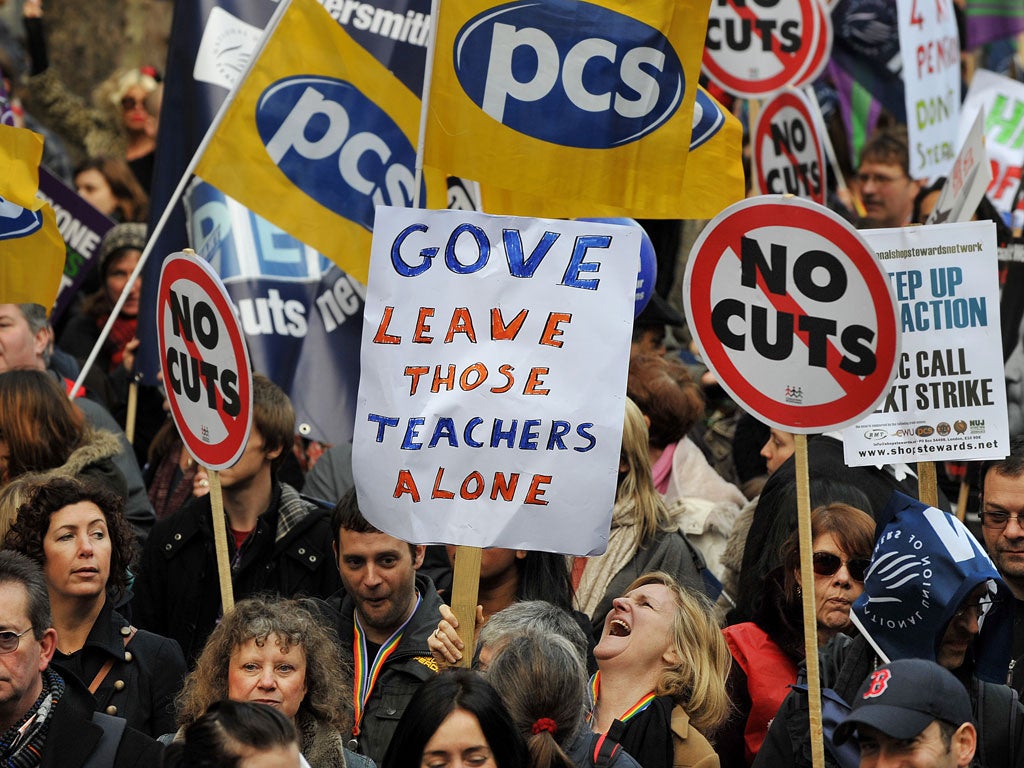Teachers vote for series of strikes this summer over pay rates and pensions
Unions vote overwhelmingly in favour of national and regional action in protest at cuts to take-home earnings

Teachers threw down the gauntlet to the Government yesterday by threatening a series of strikes starting this summer term over their pay and pensions.
The country's two biggest teachers' unions – the National Union of Teachers and National Association of Schoolmasters Union of Women Teachers – both voted overwhelmingly in favour of strikes over plans to scrap national pay rates for teachers and cut pensions.
The first strikes are likely to start in the summer term, with NUT members threatening regional days of action throughout England and Wales over increased pension contributions – which will see them facing cuts in their take-home pay for the first time in 80 years from this month – and plans to raise the pension age to 67.
Thousands of schools are likely to be sending children home – although teachers have pledged to exempt exam classes.
The NUT is also calling for joint strike action with other public service unions – again starting this summer but continuing into the autumn if necessary.
"We knew it would be a long and difficult road," said Helen Andrews, for the union's executive. "The fight for decent and fair pensions for teachers is far from over, whatever the Government may believe."
The decision, taken in private session after nearly two hours of debate, followed the defeat of a more militant demand for a national strike on 10 May.
Delegates also called for strike action in schools to protect teachers from an increased workload. One, Sarah Caffrey, from Bristol, described the Education Secretary, Michael Gove, as "he who must not be named – an evil entity who hovers around and seems to think we're doing such an exceptional job that we should be working longer and longer hours for less and less pay".
The union is also staging two day-long strikes in Nottingham later this month over a city council plan to introduce a five-term year and reduce the summer holiday to four weeks. It was described by one delegate, John Illingworth, as "the shortest summer break in the world".
In addition to regional strikes, the NUT aims to hold a national strike by the end of June. Christine Blower, NUT general secretary, said: "It is important that the Government takes this very seriously. The overwhelming majority of teachers' organisations have rejected the Government's plans for their pension schemes."
There is the prospect of more widespread strike action by public service unions after the TUC conference in September.
The NASUWT, meeting in Birmingham, called for a "ratcheting up" of strike action in the autumn term. It accused the Government of "scurrilous attacks, abuse, intimidation and lies" about teachers. The Government was behaving as if it were "at war" with the profession, said deputy headteacher Martin McCuskey.
Chris Keates, the NASUWT's general secretary, added: "Teachers do not feel there is any area of their working lives that the Government has not trampled over. It is impairing their ability to focus on raising standards for pupils."
Brian Cookson, the union's national treasurer, moved the strike motion which was passed unanimously by delegates. He said: "In the last two years we have witnessed an unprecedented, vicious, prejudiced and totally unjustified attack on the public sector across the UK."
The Department for Education said the Government's current offer on pensions was "as good as it gets" and added that it was far too premature to talk of industrial action on regional pay. A spokeswoman added: "It is absurd to say our school reforms are a 'vicious assault' on the teaching profession. They are all about putting children first and raising standards."
Meanwhile, Labour pledged yesterday that it would be "intolerant" of poor teachers. Stephen Twigg, the party's education spokesman, told the NASUWT conference that improving the quality of teaching is the key to raising standards in schools.
"That means being intolerant of those who aren't up to scratch but also attracting, rewarding and retaining the best professionals," he said.
He cited research from the education charity the Sutton Trust which claims that English schools could move into the top five in international education performance league tables within 10 years "if the country's least effective teachers were brought up to the national average".
Mr Twigg is also setting up a review of professional development for teachers to be headed by Professor Tim Brighouse.
Subscribe to Independent Premium to bookmark this article
Want to bookmark your favourite articles and stories to read or reference later? Start your Independent Premium subscription today.

Join our commenting forum
Join thought-provoking conversations, follow other Independent readers and see their replies